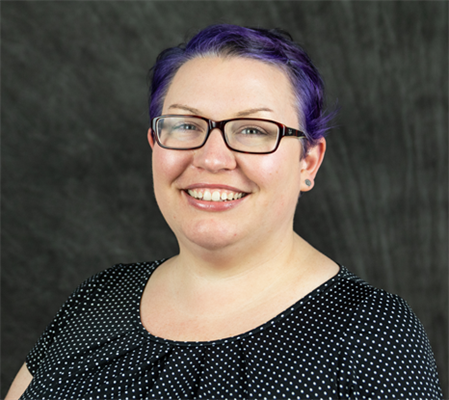Tisch Library's "Affordable Course Materials Profiles" feature interviews with faculty & instructors who have received an Affordable Course Materials Award.

This interview is with Professor Katie Mattaini, lecturer in the Department of Biology. Professor Mattaini received an award for Spring 2024, and a Summer 2024 award with Professor Mitch McVey to continue work on the project.
What department do you teach in? Which classes do you most commonly teach?
I teach in the Department of Biology, and my current classes are Bio 50: Experiments in Molecular Biology, Bio 105: Molecular Biology, and Bio 13: Cells and Organisms.
Briefly describe your project to use or create more affordable course materials for students.
Since Spring 2021, I have slowly been adding entries to build an Encyclopedia of Biological Methods, starting with a cancer biology course I taught at another institution. Before FA24, Dr. Mitch McVey and I are adding all the entries needed for our Bio 105: Molecular Biology course. I hope faculty both inside and outside Tufts will contribute, and there are possibilities of making student-written, faculty-reviewed entries into projects for biology courses, or opportunities for graduate students and postdocs. To this end, I have applied to present on the EOBM project at a teaching conference in FA24.
What motivated you to use these new materials?
The EOBM helps solve a problem faced by many biology faculty: it is good practice to use primary research literature in our classes, but not all students have the same background in the methods. The EOBM explains a variety of biological methods to students with introductory-level college biology. It introduces information at the correct level of technicality, is more reliable and directed than the results of an undergraduate Google search, and can directly address common misconceptions. Furthermore, we know anecdotally that many STEM students don’t buy even “required” textbooks due to a combination of cost and lack of time to read them. Instead, they rely on resources like Kahn Academy, YouTube videos, or other online searches. The EOBM provides students with a free, reliable, and bite-sized source for the methods components of their courses, which is more in line with the study patterns of students in the 2020s. Lastly, I have made a concerted effort to ensure that the EOBM is accessible, especially regarding alt text for scientific diagrams and data, which is relatively rare in my experience, due to the complexity of visuals involved.
How do you anticipate that students will be impacted by the new materials?
When I taught Bio 105 in SP24, the most challenging learning objectives were a) determining the correct method to use in a given situation, and b) interpreting data from real scientific figures. One of the benefits of the EOBM is that each entry not only describes the technique, but also has an “interpretation” section that gives a scientific figure using the method and explains how the data should be interpreted. So, Dr. McVey and I are hoping that the EOBM will help students reach those objectives.
Although FA24 will be our first time using the EOBM at Tufts, I did use it at another institution, and my students there found the EOBM indispensable when reading the literature. Several of them said that they would continue to refer to it in the future once our course was over. I anticipate that it will only become more useful as we add more entries!
How did the Tisch award support your work? Were there challenges?
When I came to Tufts in FA23, I had to migrate the platform on which the EOBM was published. Andrea Schuler (Head of Open Scholarship & Research Data) helped me identify LibreTexts as a new platform, and the award provided funding for me to attend LibreFest virtually in Summer 2024 to learn how to use the platform. Furthermore, writing the entries takes a LOT of time and effort, which should always be paid! The award means I get to continue to work on this project that I love and that benefits many students.
Do you have any advice for other faculty considering a switch to open and affordable course content?
There is a lot of material already out there! You don’t have to write your own like I did. Also, a lot of it is openly licensed and can therefore be remixed, meaning that you can take one chapter here, one chapter there, and add to/edit it as you wish.